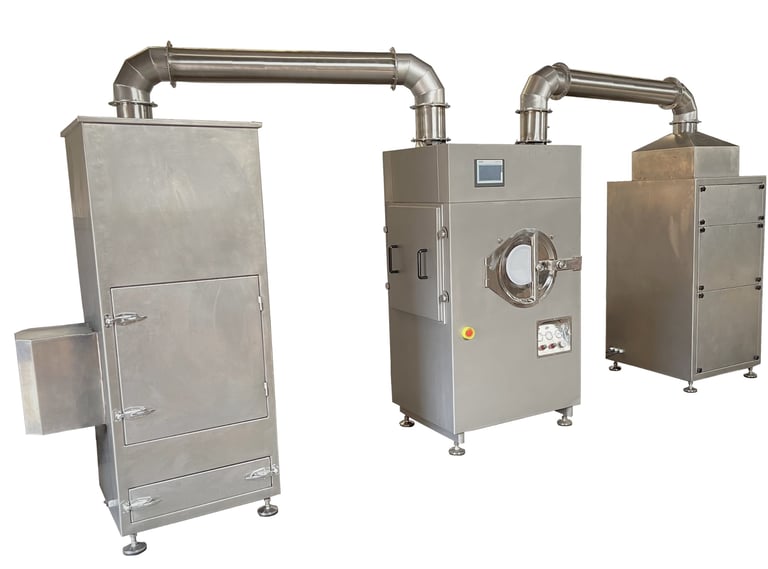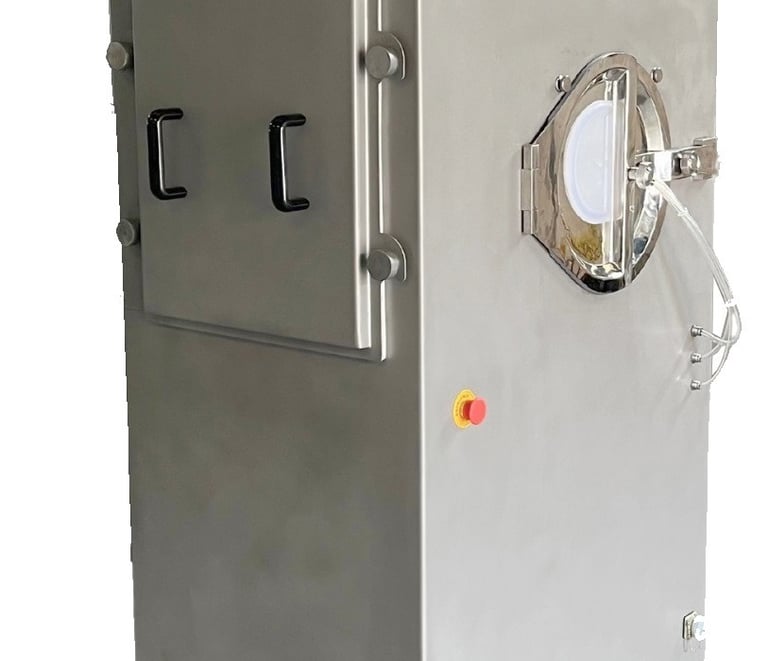From Mixing to Coating: Inside the Advanced Machinery Powering Pharma and Food Production in 2025
LEON MACHINERY
8/7/20254 min read


In the ever-evolving world of pharmaceuticals and food manufacturing, precision, hygiene, and automation are at the core of production efficiency. Modern factories rely on integrated systems to streamline processes—from mixing raw ingredients to applying the final coating on tablets or sweets. This comprehensive guide explores the full spectrum of processing machinery including coating machines, granulators, dryers, blenders, mills, and more.
The Role of Automatic Coating Machines in Modern Production
Automatic coating machines are indispensable in pharmaceutical and food industries. These machines are designed to apply film or sugar coatings to tablets, pills, and candies. Coating helps mask unpleasant tastes, enhance visual appeal, and in many cases, provide functional benefits like enteric protection or controlled release.
The automation of this process ensures uniformity, reduces human error, and increases output without compromising on hygiene or quality.
Film and Sugar Coating: Functional and Aesthetic Purposes
In pharmaceutical production, film coating can be used for controlled release, moisture protection, and even targeted drug delivery. In the food industry, sugar coating is more aesthetic but also serves to extend shelf life and improve taste.
Technological advancements have enabled machines to switch easily between different coating techniques. Whether it's polymer-based film coating or traditional sugar drenching, precision control over spray rates, temperature, and drum speed makes modern coaters invaluable.
Granulators: Where It All Begins
Before tablets or candies are coated, they must first be shaped. This starts with granulation. Granulators help in forming fine powders into granules—improving flow properties, reducing dust, and ensuring compressibility.
There are two main types: wet granulation and dry granulation machines. Wet granulators use a liquid binder and are followed by drying stages, while dry granulators compact powders without the need for solvents. Both play a key role in achieving the right consistency and quality of the final product.
FBD: The Essential Fluid Bed Dryer
Once granulation is done, the moist granules need to be dried. Enter the Fluid Bed Dryer (FBD), a highly efficient system that uses hot air to evenly and quickly dry granules. Unlike traditional ovens, FBDs prevent overheating and degradation of sensitive ingredients.
In many production lines, the granulator and FBD are connected as part of a continuous line, reducing handling time and contamination risks.
Lifting Tipper with Mill Series: Integrated Handling
Material transfer is a major challenge in high-output manufacturing. The Lifting Tipper with Mill Series solves this by integrating lifting, tilting, and size reduction in one system.
After drying, materials can be directly tipped into a mill for particle size adjustment. This minimizes material loss, prevents contamination, and improves ergonomics for operators.
Mixing Machine Series: Homogeneity Guaranteed
Mixing is not just about combining ingredients. In pharmaceutical and food applications, achieving uniformity is critical to product efficacy and quality.
Mixing machine series include:
V-type mixers for delicate blending
Double cone mixers for free-flowing powders
High-speed mixers for challenging formulations
Each has its own niche, ensuring that no matter the complexity of your recipe, there’s a mixer designed for the task.
Lifting Charging Machine Series: Streamlined Material Input
In GMP-compliant facilities, manual charging of mixers or reactors is a potential contamination risk. Lifting charging machines automate the process of transferring ingredients from containers into process equipment.
These devices not only reduce labor costs but also enhance safety and cleanliness—essential factors in regulated industries like pharma and food.
IBC Bin Series: Modular and Efficient Storage
Intermediate Bulk Containers (IBC Bins) are widely used for the storage and transport of granules and powders within a facility. Designed to be easily moved by forklifts or lifting arms, they allow for flexible plant layouts and modular production planning.
The IBC Bin series includes various sizes and configurations, with options for integrated valves, liners, and sensors to ensure compatibility with automatic loading and unloading systems.
Bin Washer Series: Clean-in-Place Systems
Sanitation is non-negotiable in the production of consumables. The Bin Washer Series automates the cleaning of IBC bins, eliminating the need for manual scrubbing.
These washers use high-pressure jets, rotary nozzles, and programmable cycles to guarantee consistent cleaning results. Their closed-loop systems also help in reducing water and chemical usage.
Cone Mill & Hammer Mill Series: Precision Particle Reduction
After drying or granulation, it’s often necessary to standardize particle size. Cone mills offer gentle, low-energy milling that preserves ingredient integrity, while hammer mills provide high-speed impact grinding.
Each serves a unique role:
Cone mills are preferred for heat-sensitive ingredients.
Hammer mills are chosen when aggressive size reduction is required.
Many systems allow interchangeable heads, giving manufacturers the flexibility to switch between methods quickly.
Pelletizer Series: Shaping with Precision
Pelletizers are used to convert fine powders into uniform, spherical granules. In the pharmaceutical sector, this is crucial for consistent dosing. In food, pelletizers shape ingredients for better texture and appearance.
Modern pelletizers can handle multiple ingredients and offer features like adjustable extrusion speed, cutting blades, and cooling mechanisms.
System Integration: From Raw Materials to Finished Product
What makes all these machines so powerful is not just their individual capabilities but how seamlessly they integrate. In 2025, facilities aim for end-to-end automation—from raw ingredient delivery to the final coated product.
Through PLC control systems, real-time data monitoring, and IoT integration, manufacturers can ensure:
Traceability of every batch
Reduced downtime
Predictive maintenance
Compliance with International Standards
All machinery described adheres to GMP, FDA, and CE regulations, ensuring global acceptance and trust. Features like HEPA filtration, anti-cross contamination design, and hygienic contact materials come as standard.
Whether it’s a pharma company making lifesaving drugs or a confectionery brand producing candy, quality and compliance are central to the production strategy.
Leon Machinery: Your Global Partner in Process Equipment
With decades of expertise, Leon Machinery provides cutting-edge process equipment for pharmaceutical and food production lines around the world.
Our machines are built for performance, safety, and adaptability—trusted by hundreds of clients globally. From consultation to installation and after-sales support, we’re with you every step of the way.
📞 WhatsApp: +8618136773114
📧 Email: leonxu0317@gmail.com
Final Thoughts: The Future of Pharma and Food Manufacturing
Automation, integration, and innovation define the future of manufacturing. By investing in versatile, modular equipment like those in the Coating Machine Series, Granulator, FBD, and more—you set your factory up for years of scalable, efficient production.
Choose the right machinery today and transform your operation into a modern powerhouse.
🔖 Hashtags
#PharmaceuticalMachinery #FoodProduction #TabletCoating #Granulator #FBD #MixingMachines #Pelletizer #LeonMachinery #IndustrialEquipment #GMPCompliance #AutomationInManufacturing


